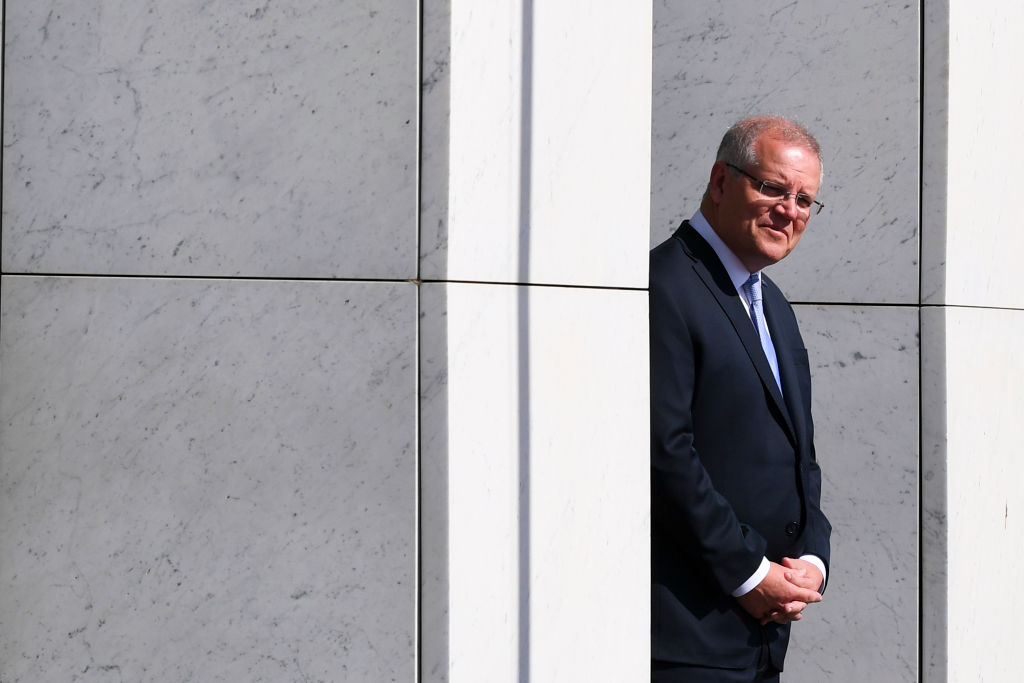
The bipartisan tenor of Australia’s foreign policy is being stretched and tested.
Scott Morrison’s Coalition government talks tough on international policy. A touch of Donald Trump is trumpeted, as foes are found and lines drawn. Labor pushes back that the prime minister’s approach to foreign affairs is all tactic and no plan.
What’s fraying is the oft-vaunted habit of bipartisanship on foreign affairs. In normal Oz fashion, bipartisanship has both pragmatic and principled elements.
The principled view is that big interests are agreed, and the Liberal and Labor parties can down weapons and stand united on the international stage—that ‘politics stops at the water’s edge’. Politics seldom stops for much in Canberra, but you get the bipartisan idea, in principle anyway.
The pragmatic or self-interested side of bipartisanship helps buttress the principle: don’t waste your powder on overseas issues the voters don’t rate as important. Standing together on stuff beyond the water’s edge means the Liberals and Labor can easily share the necessary competency tick and move on to other issues.
The testing of this bipartisan calculus was on show last week at the annual conference in Canberra of the Australian Institute of International Affairs.
At the same conference this time last year, there was a lot of bipartisan bonhomie in the opening session’s performances by Foreign Minister Marise Payne and her Labor counterpart Penny Wong. The two could easily have swapped speeches, apart from Wong’s attack on the government’s ‘deeply distressing and irresponsible climate policy’, and even that came with a preface about ‘trying to find an adjective that is not too undiplomatic’.
At the conference this year, much more undiplomatic stuff was on show. The international discussion reflects tougher times. Tone and temperature notched up in the addresses by the assistant minister for defence and minister for international development and the Pacific, Alex Hawke, and by Penny Wong.
Hawke’s discussion of values was that of a conservative government as worried about protecting its right flank as the usual threat from Labor on the left.
In both his speech and questions, Hawke referred to the way that ‘populism, protectionism, and illiberalism’ have jolted the international system; rely on politicians to rail at the poison they fear.
The answer to these ills, encapsulated in the penultimate paragraph of Hawke’s speech: ‘The Morrison government will continue to maintain a ruthless and pragmatic focus on our national interests.’
I’ve never heard an aid minister boasting in a speech about Australia being ‘ruthless and pragmatic’. But then, we’ve never before had a minister doing both the defence and aid jobs.
The joining of defence and aid says something about Morrison’s world view. It does express a Canberra truth that a past head of AusAID used to make: aid is the soft end of the defence budget. It’s a good line to use against the hard hearts and the realists (and the Morrison government does like hard, realist language).
Following Hawke (the politicians take the stage separately), Wong stepped up to rumble, saying she’d depart from Australia’s ‘tradition of a largely bipartisan approach to foreign policy’ because it’s time to speak out.
Wong said Morrison had adopted Trump tactics, using foreign policy to ‘distract and divert’, and being willing to use ‘reckless language and take risky decisions for domestic political gain’.
The shadow foreign minister set it up with a back-handed compliment: ‘There’s no doubt Scott Morrison is the best political tactician in Australia right now. He is the master of the political manoeuvre, but he hasn’t delivered anything of substance, because that’s not who he is.’
Morrison had ditched the one international plan the government has, she said, the 2017 foreign policy white paper, ‘which championed multilateralism and the rules-based order as fundamental to our national interest’.
Wong said Morrison deployed US-style populism in his ‘negative globalism’ speech earlier in the month at the Lowy Institute, where the prime minister claimed Australia was being told what to do by global organisations.
To adopt Trump’s anti-globalism language, she said, is to abandon the multilateral stance of previous Labor and Coalition governments, and risk Australia’s prosperity: ‘You can’t be pro-free trade and anti-globalist—and we all need to call Scott Morrison’s bluff on this. Even if Scott Morrison seeks to follow President Trump in closing Australia to immigration, he can never close Australia to trade.’
During questions, Wong quickly shifted back to bipartisan bedrock. Asked whether it’s time to ditch the US alliance, she replied: ‘The US alliance is beyond politics.’
The explicit bipartisanship is all about the US alliance. Trump is another place entirely; on The Donald, much of Canberra is moving beyond puzzled and perplexed towards panic.
Equally, while Wong deployed the sword on the government’s performance on China, there’s still much tacit bipartisanship.
Surface argy-bargy shouldn’t disguise the broad Coalition–Labor agreement that China is vital. And China is getting harder. And so is America. Plenty of bemusement is mixed into both those bits of bipartisan bedrock.

